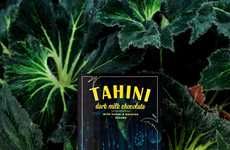
The Taza Chocolate Bars Products Incorporate Traditional Methods
References: tazachocolate & thedetoxmarket
The Taza Chocolate Stone Ground Chocolate bars incorporate traditional production methods. The dark chocolate blend is made in an authentic manner as the company uses stones to grind whole cacao beans.
The Taza label aims to merge Mesoamerican chocolate making techniques with a socially conscious manufacturing procedure. It does so via its inclusion of cacao grown in Bolivia by the cooperative Central Integral Agroecologica de Alto Beni (CIAAB).
This product is as much equitable as it is delectable. The certified organic bars are made of cane sugar, vanilla extracts and 87% dark chocolate, allowing shoppers to satisfy their cravings without the consumption of processed additives or pesticides. In sum, it is a guilt-free dessert option with an admirable social mandate.
The Taza label aims to merge Mesoamerican chocolate making techniques with a socially conscious manufacturing procedure. It does so via its inclusion of cacao grown in Bolivia by the cooperative Central Integral Agroecologica de Alto Beni (CIAAB).
This product is as much equitable as it is delectable. The certified organic bars are made of cane sugar, vanilla extracts and 87% dark chocolate, allowing shoppers to satisfy their cravings without the consumption of processed additives or pesticides. In sum, it is a guilt-free dessert option with an admirable social mandate.
Trend Themes
1. Authentic Chocolate Making - Disruptive innovation opportunity: Develop new techniques and technologies to enhance the traditional process of stone grinding cacao beans.
2. Socially Conscious Manufacturing - Disruptive innovation opportunity: Find ways to integrate sustainable and socially responsible practices into the production of food products, such as sourcing ingredients from cooperatives.
3. Guilt-free Dessert Options - Disruptive innovation opportunity: Create healthier dessert alternatives that use organic ingredients without processed additives or pesticides.
Industry Implications
1. Chocolate Manufacturing - Disruptive innovation opportunity: Explore new methods and ingredients to differentiate chocolate products in the market and appeal to socially-conscious consumers.
2. Organic Food Industry - Disruptive innovation opportunity: Develop innovative techniques and technologies to optimize organic farming and production processes, catering to the growing demand for organic products.
3. Sustainable Agriculture - Disruptive innovation opportunity: Implement new farming practices and technologies to support sustainable and environmentally-friendly agriculture, particularly in the cultivation of cacao beans.
0.8
Score
Popularity
Activity
Freshness























